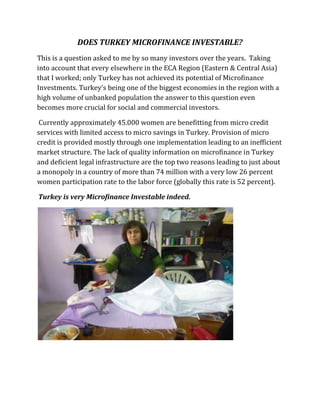
IS TURKEY READY FOR MICROFINANCE INVESTMENT
- 1. DOES TURKEY MICROFINANCE INVESTABLE? This is a question asked to me by so many investors over the years. Taking into account that every elsewhere in the ECA Region (Eastern & Central Asia) that I worked; only Turkey has not achieved its potential of Microfinance Investments. Turkey’s being one of the biggest economies in the region with a high volume of unbanked population the answer to this question even becomes more crucial for social and commercial investors. Currently approximately 45.000 women are benefitting from micro credit services with limited access to micro savings in Turkey. Provision of micro credit is provided mostly through one implementation leading to an inefficient market structure. The lack of quality information on microfinance in Turkey and deficient legal infrastructure are the top two reasons leading to just about a monopoly in a country of more than 74 million with a very low 26 percent women participation rate to the labor force (globally this rate is 52 percent). Turkey is very Microfinance Investable indeed.
- 2. Despite the strength of the reel sector and advanced level of banking infrastructure, micro entrepreneurs most of which maybe women are excluded from the formal financial system at the start-up level. Not only in Turkey but global banking sector is not that friendly to finance start ups. At that point micro credit kicks in to enable the survival of micro entrepreneurs during first years that otherwise would depend on their ability leverage their micro businesses through family/friends. As mentioned addressing the demand is not the only bottleneck in front of microfinance Investments in Turkey. How could a foreign investor start an implementation in Turkey? While the technicalities are very deep the obvious two ways are choosing between an NGO and a Bank Model. Choosing the NGO model in Turkey is quite complicated / tricky and not the way with the least resistance. However with the correct NGO model, investor would have full control over operations and implement the necessary international best practices as the way it should be but it will take time to kick off the operations. The challenge with this model tough is the legal framework permitting provision of micro credit through NGOs leads to a set-up a particular NGO structure which is not applicable in practice and resulted in failure in the past. Nevertheless still the only two implementations in Turkey are through another type of NGO structure which is possible via special regulatory permissions very complicated to obtain. On the other hand partnering with a Turkish bank most of which has advanced technologies/MIS systems and resources in place not to mention the wide branch networks is way quicker to start an implementation is the fastest wat to start a programme. Nevertheless the challenge here is to work closely with bankers on a product line which they think they knew and feel apprehensive about implementing uniquely different micro credit methodologies. One other challenge here is of course the bankers would see this as a corporate social responsibility project rather than a commercially viable business the way it should be shading sustainable micro credit operations. Still these mentioned challenges of working with Turkish bankers are no different than working with bankers elsewhere in the world. What is different in Turkey is that
- 3. regulators are encouraging investors/initiatives to partner with banks whom they already regulate unfortunately thinking that same regulatory practices would apply to micro credit operations. The bottom-line is regardless of the chosen model, one implementation could possibly not cover the unbanked in a country like Turkey. In fact there is strong demand for both models depending on demographics based on empirical evidence. From a sectoral point of view the most important impact of new investments (preferably having both models ) for microfinance in Turkey will be to lead into a competitive and mature enabling environment which eventually bring along adequate regulations and contribute to alleviating poverty and unemployment. Burcu Guvenek Araslı M.A. Senior Development Finance Expert Microfinance Instructor Middle East Technical University (METU) Faculty of Economic and Administrative Sciences
- 4. Department of Business Administration e-mail: burcu.arasli@ttmail.com e-mail: arasli@metu.edu.tr